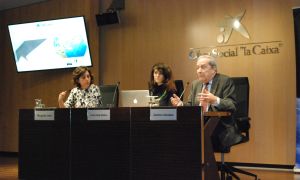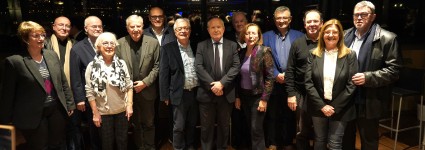"The politicization of immigration affects social cohesion and the fundamentals of democracy," said migration expert, Leila Hadj-Abdou, in her conference "Equality, equity and non-discrimination" held on January 23 at Palau Macaya, in Barcelona. Leila Hadj-Abdou is a researcher at the Migration Policy Center. She participated in the "The future is intercultural" cycle of the Re-City platform organized by the Catalunya Europa Foundation with La Caixa, the Club of Rome and the support of the Barcelona City Council, the Area Metropolitan of Barcelona and the Generalitat de Catalunya.
Leila Hadj-Abdou is one of the leading experts in interculturalism and is also a co-author of the book "The Dynamics of Regional Migration Governance" on governance, human mobility and cooperation between States. A research paper that exposes how interculturalism can help to build and strength social cohesion and which role cities can play.
Barcelona, ??leading the intercultural cities.º
Immigration is a global phenomenon but cities can have a very positive impact on actions outside state policies, said Leila Hadj-Abdou in her conference. "In fact, cities can do better than states, since they are environments of opportunities and have a great capacity to generate ideas." In this sense, she gave Barcelona as an example of the leadership of cities in this area: "Barcelona is demonstrating how immigration can be addressed as an opportunity and not as a problem."
One of the causes of immigration is the process of globalization of the economy and one of its main dangers is the politicization that some parties and media currently do. Hadj-Abdou warned about the politicization of immigration, which has a very negative impact on public opinion and also has a very skewed image of immigrants due to the impact of fake news. "Immigration is increasingly present in the public debate, but this can be counterproductive because we often speak very superficially and the use in the political debate makes it difficult to promote the rights of migrants".
Interculturalism builds and reinforces social cohesion.
Many of the citizens who have felt betrayed or forgotten by the political establishment end up moving their discontent towards immigrants. Against this discomfort, Hadj-Abdou, is clear about the antidote: interculturalism, since relations between communities of different backgrounds lead to more positive attitudes, while otherwise, there is no contact, negative reactions occur. In addition, this contact facilitates the emergence of shared projects at the local level.
Finally, Hadj-Abdou pointed out two more aspects that she considers key to build a favorable intercultural story: education and the media. Through education we can stimulate the critical thinking of young people and promote respect for diversity. And as for the media, the more they present immigration as a problem, linked to insecurity and border controls, the more the population will perceive it as a threat. "Simplifications have to be avoided, since immigration is very diverse and complex, and populist anti-immigration arguments, unfortunately, have a very negative influence on the population." Also, at the local level, the rapporteur explained, the media can have a more positive role, since they are not usually so ideologically marked, appealing to people's values.
Meanwhile, the conference moderator, Margarita León, a researcher at the UAB Institute of Government and Public Policy (IGOP), warned of the risk of school segregation in some neighborhoods or areas of more vulnerable population. "While the official discourse of some municipalities is welcoming refugees, there is still rejection of immigrants on the street," Leon said. Finally, Jaume Lanaspa, president of the Club Roma in Barcelona, ??also pointed out that, beyond the legal framework, education and local administration "are key factors to move from the general music of the law, to the management of the problems of the day on a daily basis, to guarantee non-discrimination, equity and equality."









